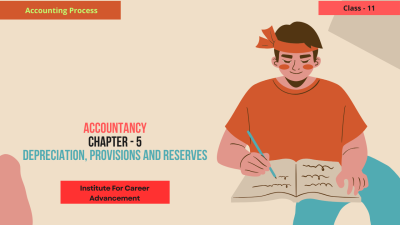| Short description |
Depreciation, Provisions, and Reserves is a crucial chapter in Class 11 Accountancy, focusing on the accounting treatment of various non-current assets and liabilities.
Key topics covered in this chapter include:
Depreciation: Understanding the concept of depreciation, its causes, and the various methods used to calculate depreciation (straight-line method, diminishing balance method, and units of production method).
Provisions: Exploring the concept of provisions, their accounting treatment, and the factors considered when creating provisions (such as doubtful debts, warranties, and employee benefits).
Reserves: Understanding the concept of reserves, their creation, and their purpose in a business (such as general reserve, capital reserve, and revenue reserve).
By studying this chapter, students gain a comprehensive understanding of the accounting treatment of non-current assets and liabilities, including depreciation, provisions, and reserves. This knowledge is essential for accurate financial reporting and decision-making.
বিভিন্ন অ-বর্তমান সম্পদ এবং দায়বদ্ধতার হিসাবরক্ষণ ব্যবস্থার উপর দৃষ্টি নিবদ্ধ করে 11তম শ্রেণীর হিসাবরক্ষণের একটি গুরুত্বপূর্ণ অধ্যায় হল অবমূল্যায়ন, বিধান এবং সংরক্ষণ।
এই অধ্যায়ে অন্তর্ভুক্ত মূল বিষয়গুলি হলঃ
অবমূল্যায়নঃ অবমূল্যায়নের ধারণা, এর কারণগুলি এবং অবমূল্যায়নের গণনার জন্য ব্যবহৃত বিভিন্ন পদ্ধতিগুলি বোঝা (straight-line method, diminishing balance method, and units of production method).
বিধানগুলিঃ বিধানগুলির ধারণা, তাদের অ্যাকাউন্টিং চিকিত্সা এবং বিধানগুলি তৈরি করার সময় বিবেচিত কারণগুলি অন্বেষণ করা (such as doubtful debts, warranties, and employee benefits).
রিজার্ভঃ রিজার্ভের ধারণা, তাদের সৃষ্টি এবং একটি ব্যবসায় তাদের উদ্দেশ্য বোঝা (such as general reserve, capital reserve, and revenue reserve).
এই অধ্যায়টি অধ্যয়নের মাধ্যমে, শিক্ষার্থীরা অবমূল্যায়ন, বিধান এবং রিজার্ভ সহ অ-বর্তমান সম্পদ এবং দায়বদ্ধতার অ্যাকাউন্টিং চিকিত্সা সম্পর্কে একটি বিস্তৃত ধারণা অর্জন করে। সঠিক আর্থিক প্রতিবেদন এবং সিদ্ধান্ত গ্রহণের জন্য এই জ্ঞান অপরিহার্য। |
|
|
| Requirements |
- Studying Depreciation, Provisions, and Reserves is essential for several reasons: Accurate Financial Reporting: Accurately accounting for depreciation, provisions, and reserves is crucial for preparing accurate and reliable financial statements. These items have a significant impact on a company's financial performance and position. Decision Making: Depreciation, provisions, and reserves are important factors to consider when making business decisions. For example, depreciation affects the cost of assets and can impact profitability, while provisions and reserves can influence a company's financial flexibility. Tax Implications: Depreciation, provisions, and reserves have tax implications. Understanding these concepts is essential for ensuring compliance with tax regulations and minimizing tax liabilities. Compliance with Regulations: Many businesses are required to follow specific accounting standards and regulations regarding depreciation, provisions, and reserves. Understanding these concepts is essential for ensuring compliance. Financial Analysis: Depreciation, provisions, and reserves are important factors to consider when analyzing a company's financial performance and financial position. Understanding these concepts is essential for making informed investment decisions. Lifelong Learning: Accounting is a constantly evolving field, and understanding the concepts of depreciation, provisions, and reserves provides a strong foundation for lifelong learning and adapting to changes in accounting practices. Career Opportunities: A strong understanding of depreciation, provisions, and reserves is essential for many careers in finance, accounting, and business management. By studying Depreciation, Provisions, and Reserves, students develop a comprehensive understanding of the accounting treatment of non-current assets and liabilities, equipping them with the knowledge and skills needed to succeed in various financial roles.
- বিভিন্ন কারণে অবমূল্যায়ন, বিধান এবং রিজার্ভ অধ্যয়ন করা অপরিহার্যঃ সঠিক আর্থিক প্রতিবেদনঃ সঠিক এবং নির্ভরযোগ্য আর্থিক বিবরণী প্রস্তুত করার জন্য অবমূল্যায়ন, বিধান এবং সঞ্চয়ের জন্য সঠিকভাবে হিসাব করা অত্যন্ত গুরুত্বপূর্ণ। এই পণ্যগুলি একটি কোম্পানির আর্থিক কর্মক্ষমতা এবং অবস্থানের উপর উল্লেখযোগ্য প্রভাব ফেলে। সিদ্ধান্ত গ্রহণঃ ব্যবসায়িক সিদ্ধান্ত নেওয়ার সময় অবমূল্যায়ন, বিধান এবং সঞ্চয় বিবেচনা করা গুরুত্বপূর্ণ বিষয়। উদাহরণস্বরূপ, অবমূল্যায়ন সম্পদের ব্যয়কে প্রভাবিত করে এবং লাভজনকতার উপর প্রভাব ফেলতে পারে, অন্যদিকে বিধান এবং মজুদ একটি কোম্পানির আর্থিক নমনীয়তাকে প্রভাবিত করতে পারে। করের প্রভাবঃ অবমূল্যায়ন, বিধান এবং সঞ্চয়ের করের প্রভাব রয়েছে। কর বিধিমালা মেনে চলা এবং করের দায়বদ্ধতা হ্রাস করার জন্য এই ধারণাগুলি বোঝা অপরিহার্য। নিয়মকানুন মেনে চলাঃ অনেক ব্যবসাকে অবমূল্যায়ন, বিধান এবং রিজার্ভ সম্পর্কিত নির্দিষ্ট অ্যাকাউন্টিং মান এবং নিয়মকানুন অনুসরণ করতে হয়। সম্মতি নিশ্চিত করার জন্য এই ধারণাগুলি বোঝা অপরিহার্য। আর্থিক বিশ্লেষণঃ কোনও সংস্থার আর্থিক কর্মক্ষমতা এবং আর্থিক অবস্থা বিশ্লেষণ করার সময় অবমূল্যায়ন, বিধান এবং সঞ্চয়ের বিষয়গুলি বিবেচনা করা গুরুত্বপূর্ণ। অবহিত বিনিয়োগের সিদ্ধান্ত নেওয়ার জন্য এই ধারণাগুলি বোঝা অপরিহার্য। আজীবন শিক্ষাঃ অ্যাকাউন্টিং একটি ক্রমাগত বিকশিত ক্ষেত্র, এবং অবমূল্যায়ন, বিধান এবং সঞ্চয়ের ধারণাগুলি বোঝা আজীবন শেখার এবং অ্যাকাউন্টিং অনুশীলনের পরিবর্তনের সাথে খাপ খাইয়ে নেওয়ার জন্য একটি শক্তিশালী ভিত্তি সরবরাহ করে। কর্মজীবনের সুযোগঃ অর্থ, অ্যাকাউন্টিং এবং ব্যবসায়িক ব্যবস্থাপনার অনেক কর্মজীবনের জন্য অবমূল্যায়ন, বিধান এবং সঞ্চয়ের একটি দৃঢ় বোধগম্যতা অপরিহার্য। অবমূল্যায়ন, বিধান এবং রিজার্ভ অধ্যয়ন করে, শিক্ষার্থীরা অ-বর্তমান সম্পদ এবং দায়বদ্ধতার অ্যাকাউন্টিং চিকিত্সা সম্পর্কে একটি বিস্তৃত বোঝার বিকাশ করে, তাদের বিভিন্ন আর্থিক ভূমিকায় সফল হওয়ার জন্য প্রয়োজনীয় জ্ঞান এবং দক্ষতার সাথে সজ্জিত করে।
|
|
|


 0
0 